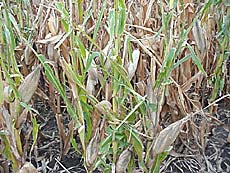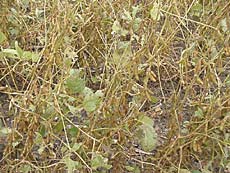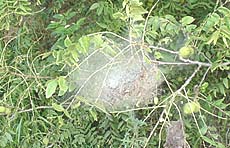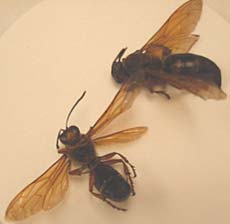|
In
corn, there is of course the visible leaf loss. Leaf loss prevents
the corn kernels from filling out completely. Fewer leaves make less
food for the plant. Leaf loss estimates range from virtually nothing
up to about 80 percent. The maturity of the corn grain also affects
the potential loss. Corn that is closer to maturity will not lose as
much yield as corn that is less mature. To give some rough
estimates, corn that was in the late milk stage at the time of the
storm and losing 80 percent of its leaf area will have yields
reduced about 35 percent. Corn in the full dent stage and having the
same leaf loss will lose about 17 percent of its yield.

There
is also other corn damage from a hailstorm. Kernels can be knocked
off ears, immature kernels can be damaged by a hailstone, and stalks
can become bruised by hail and fall over in a windstorm.
In
the case of soybeans, most plants were in the R5 stage of growth
(meaning there were small seeds in the upper pods). Once again
assuming the 80 percent defoliation, this would translate to a 43
percent yield loss. Other damage to soybean plants resulted from
directly losing beans from the stems or pods being cut off, bruising
to the stems of the plant, and in some cases having the entire
plants cut off.

[to top of second column in
this article]
|

Farmers
and insurance adjusters now have the unenviable task of trying to
reach an agreement on the amount of loss that has occurred.
Adjusters come armed with charts and calculators to determine yield
loss. Most of the information used to make calculations comes from
university research, so it is accurate. Probably more of a guess is
how much leaf loss occurred, how many beans or kernels were lost,
and what portions of fields were affected at different levels.
Farmers
should do their homework before adjusters arrive so they can show
adjusters where they feel damage is the worst and the kind of damage
that they are seeing. In the end, hopefully everyone can feel like
they were treated fairly in the adjustment of losses.
[John
Fulton]


|
|
There
are huge numbers of defoliators (things that eat leaves) working on
just about every kind of tree leaf that is left on the tree at this
time. Telltale signs that you might have this occurring would
include tree nests, stripped leaves (often leaving the vein of the
leaf) and the many droppings from what were once your leaves.

We
have had large numbers of caterpillars throughout the spring and
summer. Conditions must have been right. The ones eating tree leaves
include walnut caterpillars, eastern tent caterpillars, tussock moth
larvae and fall webworms. This is just to name the more prominent
ones. In this grouping, the ones that are easy to single out are the
fall webworms. They expand their nest and continue to feed inside
the webbing. The others leave a nest or cocoon and feed on leaves
individually or in groups. Most noticeable are the eastern tent
caterpillars that tend to work on a branch at a time and do it as a
group.
The
question most often asked is, "Will they kill my trees?"
and the answer is, "Probably not." If we think about it, these
insects exist every year in wooded areas, and very few of the trees
die. If youíve ever been to Wildlife Prairie Park during a bad
year, you can really appreciate the numbers of the eastern tent
caterpillars you can come in contact with in a short period of time.
Yet, those trees do come back year after year.
If
you canít stand the sight of the caterpillars, donít want to
look at naked trees any earlier than you have to, or want to get
even with the larvae of the Lepidoptera order, you can control them
to a certain extent. Most insecticides will provide control of the
larvae. Insecticides included would be Sevin, diazinon, Orthene,
Dursban, and B.t. as an organic control. For fall webworm, you can
also clip off the nest area and burn it.
[to top of second column in
this article]
|
The
other types of holes that I referred to are in the ground. Some are
exit holes (such as for cicadas) while others are entrance holes (as
in June bugs and cicada killer wasps). Recently, both groups have
been active. The cicadas can be heard regularly now. The wasp is a
very formidable-looking insect approaching two inches long, but it
is a relatively timid wasp that is not easily provoked. You will
have to weigh the benefits of the wasp against the risk of getting
stung. The wasp is actually killing the cicada, burying it and then
laying eggs in it. A drench of liquid diazinon in the hole area or a
general grub treatment would control the wasp.

That
brings me to grubs. June bug, Japanese beetle and green June bug
numbers have been very high in some areas. First places to check for
grubs would be along walks, driveways and patios, as well as under
security lights. If youíve kept your yard lush with water, youíll
probably get more than your share of grubs. The beetles lay their
eggs in the best-looking grass. Green June bugs are a little
different. They tend to lay their eggs in organic matter such as
gardens and flower beds. The treatment is best done with granular
products of diazinon or Grubex.
[John
Fulton]
|